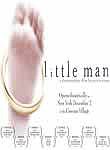Little Man

Written & directed by Nicole Conn
113 minutes – released 2005, rated PG-13
This is a sobering film about a family: a lesbian couple, their daughter, and Little Man, their premature baby. Written and directed by Nicole Conn, who brought us the lesbian flick Claire of the Moon in 1991, Little Man is “the story of how a micro-preemie brought a family to its knees.”
The start of this film is eight years in the past, when Nicole and life partner Gwen Baba meet. It is “love at first sight”. Immediately, they talk of becoming parents together and after two years of, as they put it, “insemination hell,” their daughter Gabrielle is born. Conn talks immediately about having another child, borne on the intense love of a mother.
Although Gwen carried their daughter to term, Nicole cannot carry a pregnancy and Gwen feels as though her age (45) would be a serious impediment to the health of their child. They settle on surrogacy as the answer.
When the surrogate announces she is pregnant, their joy at being Mommies again is quickly followed by devastation when they learn that their baby son is suffering from intrauterine growth retardation (slow growth), due to several serious previously undisclosed and quite serious health issues of the birth mother. At 20 weeks, Nicholas “Little Man” James is only in the 5th percentile in terms of his length and weight.
Nicole and Gwen have very differing ideas about what to do next and this movie is as much about having a preemie as it is a dissection of their struggling relationship. Gwen finally decides to join Nicole in this painful journey for the sake of their relationship because she realizes that Nicole cannot let go of Baby Nicholas, no matter what the cost…to herself, to Gwen, their relationship and their family.
Gwen retreats home to care for daughter Gabrielle, while Nicole spends all her time at the hospital with Baby Nicholas. Nicole states: “The human mind is not supposed to see a human fetus. Yet, that is exactly what Nicholas is.”
Nicole somehow feels so incredibly connected to Nicholas that even when confronted by one of her neonatologists about signing a “Do Not Resuscitate” consent for her son, she very openly admits that she cannot be the dispassionate caregiver this situation so clearly demands. At one point, her doctor refers to her as “an extremely committed parent, a fierce advocate for Nicholas, but also a real pain in the ass.”
In the struggle to connect, Gwen and Nicole face the emotional peaks and valleys that having a seriously ill child entails. Gwen talks about feeling forced to accept this situation with Nicole and Baby Nicholas. In coming to terms with Nicole’s intense desire to see this baby live, Gwen also comes to understand why people get divorces over issues just like this.
Nicholas comes home after nearly six months in the Neonatal Intensive Care Unit at Cedar’s Sinai Hospital. His arrival seems only to increase the rift between Gwen and Nicole, as neither feels they have time or energy to connect with each other.
At 11 months, Nicholas stops eating and begins to lose weight, something he can ill-afford to do. Nicole talks with Gwen about the burden of Nicholas and gives her permission to step aside if it is too much for her to handle, but tells her that she will be with Nicholas until the very end. Nicole frets for her daughter and worries that she places too much of an emotional burden on the young girl. Nicole refers to her daughter Gabrielle as her “heart” and her son as her “soul.”
Ultimately, while Little Man is a story about the nearly overwhelming obstacles to a child’s unlikely survival, it is equally as much about the tenuous strings that hold parents together and how to strengthen those ties when circumstances stretch them, nearly beyond endurance.
So, yes, Little Man is about being lesbian parents, it is about having a special needs child, but I honestly feel that what you can also take away from this film is the bond between two committed people who choose to have children together, no matter what their gender or situation.
Information published on The Rainbow Babies website is not a substitute for proper medical advice, diagnosis, treatment or care. Always seek the advice of a physician or other qualified health providers with any questions you may have regarding a medical condition.
Disclaimer: The Rainbow Babies provides sample contracts and legal/social health articles for informational purposes only—please do not consider it as legally-binding advice of any kind.



